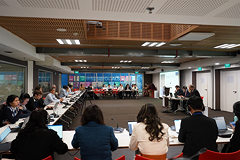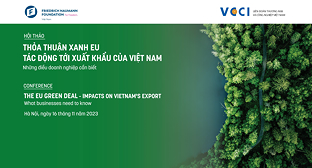Coffee, rubber and many others affected by new EU policies on anti-deforestation
27/02/2023 12:50

Việt Nam, one of the EU's main importer of forestry-based products is facing great challenges in adapting to these new policies from the EU.
Around 90 per cent of deforestation in the world is currently provoked by the expansion of agricultural land, according to a report from the European Union.
This is one of the main reasons why the EU is enforcing regulations on trade in legal and "deforestation-free" commodities and products.
Việt Nam, one of the EU's main importers of forestry-based products, is facing great challenges in adapting to these new policies.
This information was disclosed in a technical workshop titled "Workshop on Deforestation-free Coffee Production and Commercialization" organised by the United Nations Development Programme (UNDP), the European Union (EU) Delegation, and the Việt Nam Administration of Forestry under the Ministry of Agriculture and Rural Development (MARD) on Friday.
The main forestry product of the workshop's focus is coffee - one of Việt Nam's most famous export products.
Many world-leading producers in coffee such as Lavazza, the Italian leading roster coffee company, also participated in the workshop to share their experiences.
"The EU, among other big consumer countries, contributes to it by consuming a significant share of products associated with deforestation and forest degradation," said Jesus Lavina, Deputy Head of Cooperation, EU Delegates in Việt Nam.
"Therefore, The EU has the responsibility to contribute to ending it."
According to Lavina, the EU Deforestation Regulation, proposed on November 2021, recently reached a provisional political agreement on December 2022 by the European Parliament and the European Council and is going to be adopted in mid-2023.
The Regulation sets mandatory due diligence rules for companies that want to place these commodities on the EU market with the aim of ensuring that only deforestation-free and legal products are allowed onto the EU market.
The European Commission will use a benchmarking system to assess countries and their deforestation risk levels and forest degradation driven by the commodities in the scope of the regulation.
Lavina added: "This regulation comes in addition to many other international action and cooperation instruments that we continue to pursue, in line with the EU Communication on Stepping up Action to Restore and Protect the World’s Forests, and we hope it will raise the global level of ambition in halting deforestation."
The regulation also complements and reinforces trade agreements and makes sure that increasing trade does not lead to increased deforestation.
Goods predicted to be affected by the regulation includes palm oil, soy, wood, cattle, cacao, coffee, rubber and rubber-related products.
Lavina also added that the regulations would affect all producers both inside and outside the EU and all related participants must be ready for the upcoming implementation of the regulation in 2024.
"The European Union will not import any products or goods within the regulation that originated from deforested areas after December 31, 2020," said Lavina.
Việt Nam is taking steps to solve the deforestation issue and get ready for the new regulations in the EU.
Đắk Nông and Lâm Đồng localities are closely working with the UNDP and the MARD to implement the landscape project.
The project aims to enhance the active participation of different stakeholders in land use planning and monitoring, identify and further develop ecologically sound agricultural practices, provide technical support and promote the multi-stakeholder partnership between governments, farmers, and international companies to leverage their respective roles and means, supports sustainability and deforestation-free commodity criteria and sustainable production models, which are crucial in meeting the new global regulations.
Patrick Haverman, Deputy Resident Representative of the UNDP in Việt Nam, said: "With the recent global context and regulations on sustainable production and commercialisation, and deforestation-free supply chains, UNDP is ready to work with government partners and the private sector to create an enabling environment for sustainable deforestation-free agricultural product supply chain and to support the deforestation-free production and commercialization model.
"I hope together we can make a difference to the forests and livelihoods of people in Việt Nam and also in other places."
Trần Quang Bảo, Deputy Director General of the Việt Nam Administration of Forestry, said that Việt Nam's agricultural exports in the near future would be impacted by this law, particularly coffee, which is the largest export commodity of Việt Nam's agricultural, forestry, and aquatic sector to the European market.
"The Central Highlands, which is not only known as the coffee capital but has also been developing other agricultural products such as rubber, black pepper, and fruit trees in recent years, is an important area for agricultural production and a key part of Việt Nam's agricultural development strategy.
"At this workshop, through sharing EU regulations and experiences of businesses and international friends in developing forest-friendly industries, we expect to exchange, discuss and learn from our international partners to build a roadmap for developing Việt Nam's agricultural export sectors that comply with EU regulations," said Bảo.
Source: Viet Nam News
Các tin khác
- Businesses capitalize on recovery momentum to explore market expansion (17/04/2024)
- Canada is second largest consumer of Vietnamese pangasius in CPTPP bloc (17/04/2024)
- India’s tariff removal on several US products benefiting farmers: Katherine Tai (17/04/2024)
- Thailand Contemplates Protective Tariffs on Chinese Imports Amidst Surging Trade Deficit (17/04/2024)
- Vietnam becomes largest banana exporter to Chinese market (17/04/2024)
 Home
Home
 About Us
About Us




















